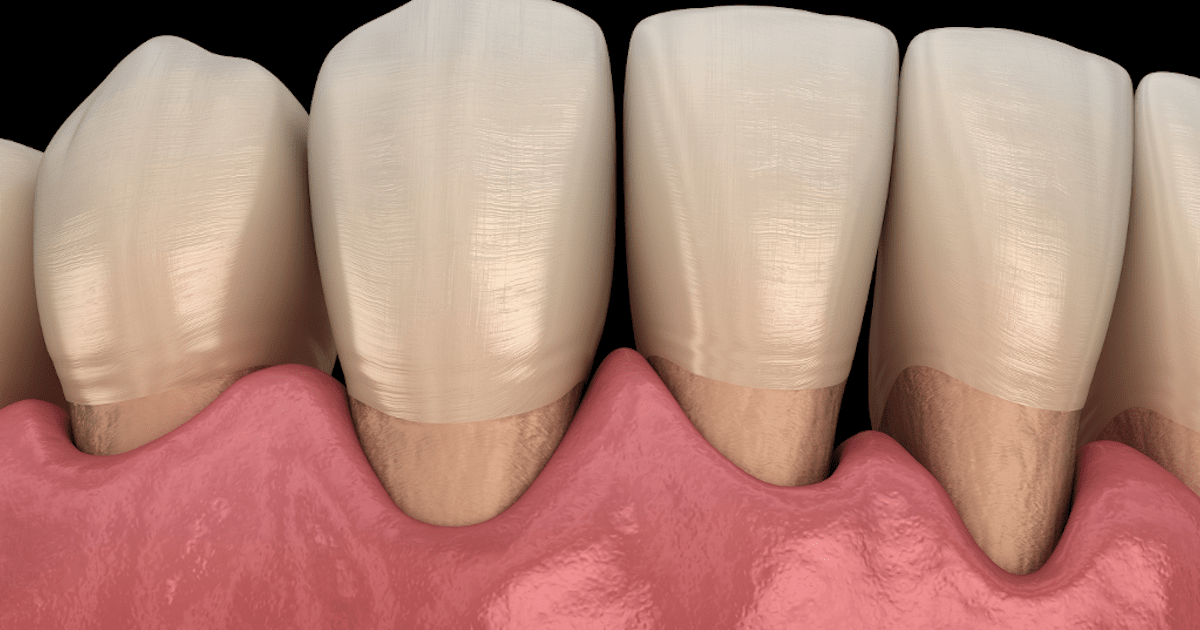
Gum recession is when the gums pull away or recede to expose more of the teeth and their root. Receding gums are one of the most technically sensitive and surgically demanding treatments in clinical dentistry.
They can become a health concern exposing the roots of the teeth and creating gaps between them, leaving the teeth at risk of decay, infection, and loss.
Various treatments are available according to the intensity of your condition. These include deep cleaning, medicating infections, tissue surgery, and even laser treatments that we’ll talk about in detail.
Common Symptoms Of Receding Gums
Identifying symptoms of gum disease early is key to protecting your teeth and gums. Since the severity of gum recession varies from person to person, it is important to understand your symptoms before proceeding with treatment.
These can vary from being minor to being excessively painful. Look out for:
- Bleeding after brushing your teeth
- Changing appearance – as the tooth appears longer, the gap between your teeth may increase and cause jaw aches
- Red, swollen gums
- Sensitivity to cold and heat due to exposed tooth roots
- Bad breath
Treatments For Gum Recession
Your dental practitioner can conduct a comprehensive exam to find out if you are suffering from this issue. Then they will examine the condition of your gums and devise the treatment plan accordingly.
The first step is to check if the gum recession is minor and can be treated through a course of antibiotics. In some cases, it only takes to treat the affected area.
However, the loss of small bones and deep pockets can render the deep cleaning ineffective – in this case, gum surgery is required.
Following are the types of surgical treatments that we may employ:
Open Flap Scaling And Root Plaining
During this procedure, the gum doctor folds open the affected gum tissue, removing any bacteria or cavity from the pockets, and then folds back the gum tissue in its original place. This eliminates harmful pockets or reduces their size.
Usually, this process is done after the patient has been sedated/anesthetized so that these procedures can be carried out painlessly while the patient “sleeps”.
Regeneration
In severe cases where gum recession may cause bone loss, more elaborate treatment will be required. Surgical procedures to regenerate lost bones and tissue may be recommended.
Similar to the previous procedure of reduction of pocket size, your dentist will first remove any bacteria by folding back the gum tissue and then proceed with the remainder of the surgery.
To encourage natural redevelopment of bone and tissue, a regenerative material like a graft tissue or protein is applied to the tooth, with the gum tissue secured over it.
Laser Treatment
With laser as a practical option, patients are now opting to choose this path for bone-building procedures. In this treatment, the dentist uses a laser to access the infection and kill the harmful bacteria.
Once this infected tissue is removed, the area is cleaned with an ultrasonic root cleaner, which is far more effective than hand-held tools. Laser energy seals the tissues against the tooth root and protects them.
The reason more patients opt for laser treatment as compared to surgery is that they are less invasive, and there’s no need for anaesthesia. This reduces the pressure, ensuring that patients feel more comfortable and less anxious about the procedure.
Also, the trauma resulting from laser treatment leaves little to no effect on the gums, tooth, jaws, and the surrounding areas. There are no swollen gums or bleeding; the healing time is drastically reduced compared to traditional surgery. The patient can function normally and recover faster – they may even be allowed to eat normally 48 hours later.
What Can I Do To Prevent Gum Diseases?
Brushing your teeth and flossing helps to prevent any kind of gum disease. Using a mouthwash is always a good idea to remove food debris and plaque that gets stuck to your teeth.
Age-related issues, smoking, and your diet should also be kept in check, as they can increase the risk of periodontal diseases. Make sure to talk to your dental professionals regularly.
At Orchard Scott’s dental, we emphasize proper diagnosis of receding gums and devise an appropriate plan of treatment with the help of our experienced and trusted periodontists.
For more information, visit our page on Gum Disease Management as well as laser-gum reshaping treatment for Gummy Smiles. If you wish to speak to someone from our staff, contact us.


